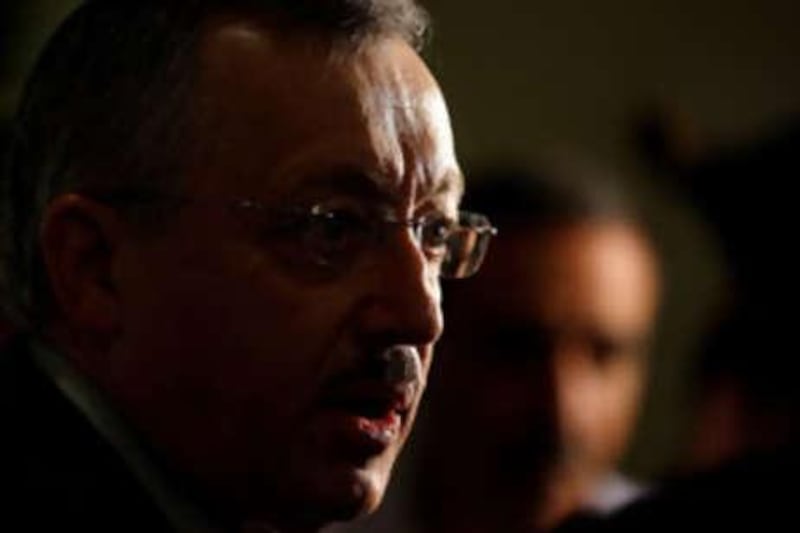BEIRUT // Lebanon's bickering politicians were on the verge of a deal to form a government of national unity yesterday, two months after an agreement reached in Qatar ended a long-running political crisis that brought the country perilously close to civil conflict. Formation of the government has remained a critical step to concluding the country's two-year-long political crisis that, just three months ago, sparked open clashes between Hizbollah fighters and gunmen loyal to the March 14 movement, in scenes reminiscent of the country's bloody civil war. Continuing skirmishes and sectarian violence, especially in northern Lebanon, and continued deadlock between the various political factions in Beirut have soured the initial optimism surrounding the Doha agreement signed in May that promised to settle the crisis. Ahmad Fatfat, the youth and sports minister, said an announcement of a new government was expected last night, but political sources said it could take another two days. "Certain parties have realised that the situation could not continue to be blocked," Mr Fatfat said, hinting at opposition figures. Amr Moussa, the secretary general of the Arab League, said in a statement that he had received and made "intensive calls" with Lebanese and regional leaders, and they had all confirmed "real progress has been achieved" in forming the new cabinet. It was not immediately clear how the breakthrough was achieved, although it appears it took Qatar's intervention once more. Sheikh Hamad bin Jassem bin Jaber al Thani, the Qatari foreign minister, held late-night talks with Fouad Siniora, the prime minister-designate, and Nabih Berri, the parliamentary speaker who returned to Beirut unexpectedly early from a private visit to Rome. "It is over," Mr Berri told reporters, referring to the stalemate. Altogether the creation of the new government was delayed for six weeks because of disagreements about the division of cabinet portfolios among political parties. The Doha agreement stipulates that the March 14 coalition, which represents the parliamentary majority, is to hold 16 cabinet seats, the Hizbollah-led opposition has 11 seats, while Michel Suleiman, the president, can allocate the remaining three seats to whom he chooses. Among those three seats, however, are the key interior and defence portfolios. The wrangling centred on the level of representation in the new government by the Change and Reform bloc, headed by Michel Aoun, a Christian opposition leader. Numerous proposals and demands were put forward by either side to no avail. Mr Aoun is reported to have agreed to having representatives from his block fill the portfolios of telecommunications, energy, social affairs and agriculture as well as the seat of deputy prime minister. Mr Aoun's Christian rival, Samir Geagea, leader of the Lebanese Forces, apparently will retain the justice and public works ministries. In a symbolic gesture that appears to have cemented the deal, Mr Aoun hosted Mr Siniora at a lunch yesterday at his home in Rabiyeh outside Beirut after 90 minutes of talks between the two men. Mr Siniora said he and Mr Aoun had agreed on the distribution of cabinet portfolios and the names of individuals to fill the posts. "There are no more obstacles to form the government and I am trying to finalise the formation of the cabinet but not ready yet to announce the date of the birth of the cabinet," Mr Siniora told reporters at Rabiyeh. Hizbollah will hold three seats in the next government while the remaining eight posts allocated to the opposition will be filled by its allies. "The national opposition will be a key partner in the government, with Hizbollah and the Amal Movement," said Hussein Khalil, a political aide to Sayyed Hassan Nasrallah, the Hizbollah leader, after a meeting with Mr Berri, who also heads the Amal Movement. Mr Khalil said the distribution of cabinet portfolios had been agreed upon, and all that is left is "the final touches on the names of the ministers". The new cabinet will then meet to discuss the contents of its policy statement, likely to be the next subject of contention between the parliamentary majority and the opposition, especially over the status of Hizbollah's armed wing. The previous government's policy statement, drawn up in July 2005, asserted that "national resistance is a true and sincere expression of the national right of the Lebanese to liberate their land and face Israel's threats and aggressions". The statement also finessed UN resolutions calling for Hizbollah's disarming by declaring that "national unity" took precedence. It was on that basis that Hizbollah agreed to join Mr Siniora's first government. However, subsequent developments led the Hizbollah ministers and their allies to walk out of the government in Nov 2006, precipitating a crisis that only ended with the Doha agreement. Political analysts expect the new policy statement will similarly sidestep the issue of Hizbollah's arms, leaving the subject to the anticipated national dialogue sessions hosted by Mr Suleiman that will group Lebanon's top leaders at Baabda palace. The dialogue sessions are expected to begin as soon as the new government is approved by parliament. Last week, Sheikh Nasrallah repeated that Hizbollah was willing to engage in a dialogue over its arms in the context of defining a strategy of national defence. Hizbollah maintains that only its style of armed resistance is capable of deterring Israeli aggression, making it integral to the nation's defence. Hizbollah's critics argue that only the state has the right to bear arms and decide matters of war and peace.
@email:nblanford@thenational.ae





